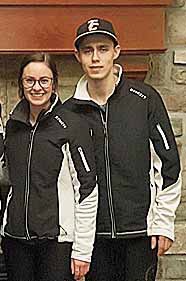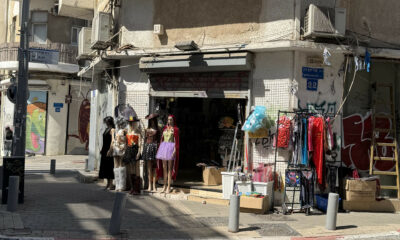Local News
Two Jewish athletes receive prominent recognition in the Winnipeg Free Press – on the same day!

By BERNIE BELLAN When’s the last time two Jewish athletes received widespread recognition on the sports pages of the Winnipeg Free Press on the same day?
In today’s (March 26) issue, there are stories about Edmonton Oilers hockey player Zack Hyman and Winnipeg curler Kyle Doering.
Hyman, who’s in town today as his team plays the Winnipeg Jets, has achieved a special renown for having scored 50 goals this year. As the Free Press story about him notes, he’s the third oldest player ever to achieve that milestone for the first time.
As for Doering, his recognition today comes from his having been selected by Canadian Men’s Curling Champion Brad Gushue to serve as the fifth man on Gushue’s team in the upcoming Mens’ World Championship in Switzerland.
But, rather than focus on their most recent accomplishments, we thought we’d look back at some past stories that had run about both Hyman and Doering, both of which tell us something about their connections to the Jewish community.
As a personal aside, I had met Kyle many years ago when he was nominated for the Rady JCC Jewish Athlete of the Year. Then, in 2017, I happened to meet up with him again when he was practicing curling at the Granite Curling Club in preparation for the Canadian Mixed Doubles Curling Championship. As I chatted with Kyle – and his curling partner, Ashley Groff, Kyle asked me whether The Jewish Post & News would consider being a sponsor for their team. I agreed – and for two years running, we did sponsor Kyle and Ashley. I never realized though that, as a result, Kyle and Ashley would put the name “The Jewish Post & News” on their jackets! I was impressed that they were willing to go as far as doing that.

Here then are excerpts from stories about both Kyle Doering and Zach Hyman, which give some information about their backgrounds:
From Harvey Rosen’s April 6, 2011 “Sporting Touch” column:
“Was in touch recently with former Winnipegger Billy Lifchus who has been living in Toronto for over 20 years. He tells me that his grandson Kyle Doering, 15, who is his daughter Bonnie’s son, recently skipped his team to a bronze medal over New Brunswick at the Canada Winter Games in Halifax.
Billy’s mom is the late Bella Lifchus, who came over from Europe together with my late mother Sarah Rosen.
Kyle, an East St. Paul resident, made a triple-raise takeout to score a six-ender against Ontario in the round-robin part of the tournament, and his shot was featured across Canada on TSN.
Billy, as any proud grandfather might offer, noted: “Probably the best Jewish curler in these parts since Terry Braunstein and Allan Shinfield.”
From Harvey’s March 1, 2017 column:
Now let’s rock with Jewish curler Kyle Doering (whose grandfather, Bill Lifchus, once wrote a financial column for this paper). When I last spoke with the personable young Doering, who is now 21, it was in 2012 when he was in high school in West Kildonan. The then-skip had just led his team to a Canadian Junior title.
Last year his junior curling team won the Canadian championship and earned a bronze medal in Copenhagen, Denmark at the World Junior Curling Championship.
He was in conversation recently at the Granite Curling Club with our Bernie Bellan and inquired if the Jewish Post & News would be interested in sponsoring his “Mixed Doubles” curling team. The latter game is a new and exciting variation of the sport and will be featured in the next Olympic games.
Needless to say, as many other Jewish kids (athletes) have learned over the years, financial support is a must if they hope to compete, say, in the Maccabiah or Maccabi games, they require support.
In any event, Bellan was prepared to sponsor the team with a gold member contribution of $200. Doering was extremely gratified for Bellan’s generosity and asked me to thank him again.
As for Zach Hyman, there was a terrific story in the Alberta Jewish News’ August 9, 2021 issue, which was written just after Hyman had been acquired by the Edmonton Oilers from the Toronto Maple Leafs. The story was written by Jeremy Appel.
Recent Edmonton Oilers acquisition Zach Hyman says the supportive Jewish environment he was raised in gave him a strong foundation of support for launching and sustaining his professional hockey career.
“It was very familial,” Hyman, who has four brothers, says of his Jewish upbringing in Toronto. “I had great, supporting parents, who really believed in me and tried to encourage me to follow my dreams and my passions. And I had a great support system of extended family, and of course a very strong community behind me.”
Hyman, 29, signed a seven-year $38.5-million contract with the Oilers in late-July after playing six seasons with the Toronto Maple Leafs, where he scored 185 regular season points — 86 goals and 99 assists — as well as 13 playoff points.
“That was a special time to be able to play for my home team to start my career out, but I’m really excited about this new chapter in my life and this new opportunity,” Hyman said.
He says he’ll be moving to Edmonton in early September in time for Oilers training camp. He plans to grow his family and provide his kids with a strong Jewish communal upbringing, just like the one he had.
Hyman, who says he knew he wanted to play in the NHL from a young age, describes his Jewish upbringing as secular — he grew up attending shul on the High Holidays and doesn’t consume pork. “For me, being Jewish is more than just a religion. Obviously, there’s a really big communal aspect to it,” he said, describing the distinction between various religious denominations as “blurred”.
He received a full Jewish day school education growing up in Toronto — first at the United Synagogue Day School, and then at the Community Hebrew Academy of Toronto Tanenbaum Campus for high school, where he met his future wife, with whom he has an eight-month-old son named Theo and a Siberian Husky dog named Whitey.
After taking a year off to focus on hockey, Hyman spent four years playing hockey on a scholarship at the University of Michigan starting in 2011, where he majored in history.
While his Jewish education provided him with a strong communal foundation, playing hockey allowed Hyman to expand his social sphere outside the Jewish bubble, interacting with people of various backgrounds, he says.
“For me, leaving home and going to university outside of Toronto obviously was a change, but I think hockey prepared me for that,” said Hyman. “It was an incredible experience. I learned a ton there, and it really helped propel my hockey career and shape my career too.”
Growing up, he played for various teams in the Greater Toronto Hockey League — the Toronto Red Wings, the Jr. Canadiens and Mississauga Reps — before moving on to the Ontario Junior A Hockey League, where he played for the Hamilton Red Wings.
In 2013, he represented Canada at Israel’s Maccabi Games, where he won a gold medal.
Hyman was number 11 on the Leafs, but he can’t use that number on the Oilers, since it’s retired as Mark Messier’s, so Hyman will be playing as number 18, which is the day in December Theo was born on, in addition to its Jewish significance of chai, the hebrew word for life.
Hyman has published three children’s books with Penguin Random Rouse since 2014 — The Bambino and Me, Hockey Hero and The Magician’s Secret.
Ultimately, Hyman says the Toronto Jewish community’s support for his ambitions, from his teachers who allowed him to do work outside the classroom to accommodate his hockey commitments to his family’s large network of friends who all wanted to see him succeed, was instrumental in his success. “Everybody was cheering for me and supporting me, and rooting me on,” he said.

Local News
Winnipeg Jewish Theatre breaks new ground with co-production with Rainbow Stage

By MYRON LOVE Winnipeg Jewish Theatre is breaking new ground with its first ever co-production with Rainbow Stage. The new partnership’s presentation of “Fiddler on the Roof” is scheduled to hit the stage at our city’s famed summer musical theatre venue in September 2026.
“We have collaborated with other theatre companies in joint productions before,” notes Dan Petrenko, the WJT’s artistic and managing director – citing previous partnerships with the Segal Centre for the Performing Arts in Montreal, the Harold Green Jewish Theatre in Toronto, Persephone Theatre in Saskatoon and Winnipeg’s own Dry Cold Productions. “Because of the times we’re living through, and particularly the growing antisemitism in our communities and across the country, I felt there is a need to tell a story that celebrates Jewish culture on the largest stage in the city – to reach as many people as possible.”
Last year, WJT approached Rainbow Stage with a proposal for the co-presentation of “Fiddler on the Roof.” Rainbow Stage management was really enthusiastic in their response, Petrenko reports.
“We are excited to be working with Winnipeg’s largest musical theatre company,” he notes. “Rainbow Stage has an audience of more than 10,000 people every season. Fiddler is a great, family-oriented story and, through our joint effort with Rainbow Stage, WJT will be able to reach out to new and younger audiences.”
“We are also working to welcome more diverse audiences from other communities, as well as newcomers – families who have moved here from Israel, Argentina and countries of the former Soviet Union.”
Helping Petrenko to achieve those goals are two relatively new and younger additions to WJT’s management team. Both Company Manager Etel Shevelev, and Head of Marketing Julia Kroft are in their 20s – as is Petrenko himself.
Kroft, who is also Gray Academy’s Associate Director of Advancement and Alumni Relations, needs little or no introduction to many readers. In addition to her work for Gray Academy and WJT, the daughter of David and Ellen Kroft has been building a second career as a singer and actor. Over the past few years, she has performed by herself or as part of a musical ensemble at Jewish community events, as well as in various professional theatre productions in the city.
Etel Shevelev is also engaged in a dual career. In addition to working full time at WJT, she is also a Fine Arts student (majoring in graphic design) at the University of Manitoba. Outside of school, she is an interdisciplinary visual artist (exhibiting her work and running workshops), so you can say the art world is no stranger to her.
(She will be partcipating in Limmud next month as a member of the Rimon Art Collective.)
Shevelev grew up in Kfar Saba (northeast of Tel Aviv). She reports that in Israel she was involved in theatre from a young age. “In 2019, I graduated from a youth theatre school, which I attended for 11 years.” In a sense, her work for WJT brings her full circle.
She arrived in Winnipeg just six years ago with her parents. “I was 19 at the time,” she says.
After just a year in Winnipeg, her family decided to relocate to Ottawa, while she chose to stay here. “I was already enrolled in university, had a long-term partner, and a job,” she explains. “I felt that I was putting down roots in Winnipeg.”
Etel expects to graduate by the end of the academic year, allowing her to focus on the arts professionally full-time.
In her role as company manager, Shevelev notes, she is responsible for communications with donors, contractors, and unions, as well as applying for various grants and funding opportunities.
In addition, her linguistic skills were put to use last spring for WJT’s production of “The Band’s Visit,” a story about an Egyptian band that was invited to perform at a cultural centre opening ceremony in the lively centre of Israel, but ended up in the wrong place – a tiny, communal town in southern Israel. Shevelev was called on to help some of the performers with the pronunciation of Hebrew words and with developing a Hebrew accent.
“I love working for WJT,” she enthuses. “Every day is different.”
Shevelev and Petrenko are also enthusiastic about WJT’s next production – coming up in April: “Ride: The Musical” debuted in London’s West End three years ago, and then went on to play at San Diego’s Old Globe theatre to rave reviews. The WJT production will be the Canadian premiere!
The play, Petrenko says, is based on the true story of Annie Londonderry, a young woman – originally from Latvia, who, in 1894, beat all odds and became the first woman to circle the world on a bicycle.
Petrenko is also happy to announce that the director and choreographer for the production will be Lisa Stevens – an Emmy Award nominee and Olivier Award winner. (The Olivier is presented annually by the Society of London Theatre to recognize excellence in professional London theatre).
“Lisa is in great demand across Canada, and the world really,” the WJT artistic director says. “I am so thrilled that we will be welcoming one of the greatest Jewish directors and choreographers of our time to Winnipeg this Spring.”
For more information about upcoming WJT shows, readers can visit wjt.ca, email the WJT office at info@wjt.ca or phone the box office at 204-477-7515.
Local News
Rising Canadian comedy star Rob Bebenek to headline JCFS’ second annual “Comedy for a Cause”

By MYRON LOVE Last year, faced with a federal government budget cut to its Older Adult Services programs, Jewish Child and Family Service launched a new fundraising initiative. “Comedy with a Cause” was held at Rumor’s Comedy club and featured veteran Canadian stand-up comic Dave Hemstad.
That evening was so successful that – by popular demand – JCFS is doing an encore. “We were blown away by the support from the community,” says Al Benarroch, JCFS’s president and CEO.
“This is really a great way to support JCFS by being together and having fun,” he says.
“Last year, JCFS was able to sell-out the 170 tickets it was allotted by Rumor’s,” adds Alexis Wenzowski, JCFS’s COO. “There were also general public attendees at the event last year. Participants enjoyed a fun evening, complete with a 50/50 draw and raffle. We were incredibly grateful for those who turned out, the donors for the raffle baskets, and of course, Rumor’s Comedy Club.
“Feedback was very positive about it being an initiative that encouraged people to have fun for a good cause: our Older Adult Services Team.”
This year’s “Comedy for a Cause” evening is scheduled for Wednesday, February 25. Wenzowski reports that this year’s featured performer, Rob Bebenek, first made a splash on the Canadian comedy scene at the 2018 Winnipeg Comedy festival. He has toured extensively throughout North America, appearing in theatres, clubs and festivals. He has also made several appearances on MTV as well as opening shows for more established comics, such as Gerry Dee and the late Bob Saget.
For the 2026 show, Wenzowski notes, Rumors’ is allotting JCFS 200 tickets. As with last year, there will also be some raffle baskets and a 50/50 draw.
“Our presenting sponsors for the evening,” she reports, “are the Vickar Automotive Group and Kay Four Properties Incorporated.”
The funds raised from this year’s comedy evening are being designated for the JCFS Settlement and Integration Services Department. “JCFS chose to do this because of our reduction in funding last year by the federal government to this department,” Wenzowski points out.
“Last year alone,” she reports, “our Settlement and Integration Services team settled 118 newcomer families – from places like Israel, Mexico, Brazil, and Argentina. Each year, our program supports even more newcomer families with things like case management, supportive counselling, employment coaching, workshops, programming for newcomer seniors, and more.”
“We hope to raise more than $15,000 through this event for our Settlement and Integration Program,” Al Benarroch adds. “The team does fantastic work, and we know that our newcomer Jewish families need the supports from JCFS. I want to thank our sponsors, Rumor’s Comedy Club, and attendees for supporting us.”
Tickets for the show cost $40 and are available to purchase by calling JCFS (204-477-7430) or by visiting here: https://www.zeffy.com/en-CA/ticketing/jcfs-comedy-for-a-cause. Sponsorships are still available.
Local News
Ninth Shabbat Unplugged highlight of busy year for Winnipeg Hillel

By MYRON LOVE Lindsay Kerr, Winnipeg’s Hillel director, is happy to report that this year’s ninth Shabbat UnPlugged, held on the weekend of January 9-11, attracted approximately 90 students from 11 different universities, including 20 students who were from out of town.
Shabbat UnPlugged was started in 2016 by (now-retired) Dr. Sheppy Coodin, who was a science teacher at Gray Academy, along with fellow Gray Academy teacher Avi Posen (who made aliyah in 2019) – building on the Shabbatons that Gray Academy had been organizing for the school’s high school students for many years.
The inaugural Shabbat UnPlugged was so successful that Coodin and Posen did it again in 2017 and took things one step further by combining their Shabbat UnPlugged with Hillel’s annual Shabbat Shabang Shabbaton that brings together Jewish university students from Winnipeg and other Jewish university students from Western Canada.
As in the past, this year’s Shabbat UnPlugged weekend was held at Lakeview’s Hecla Resort. “What we like about Hecla,” Kerr notes, “is that they let us bring in our own kosher food, it is out of the city and close to nature for those who want to enjoy the outdoors.”
The weekend retreat traditionally begins with a candle lighting, kiddush and a traditional Shabbat supper. Unlike previous Shabbats UnPlugged, Kerr points out, there were no outside featured speakers this year. All religious services and activities were led by students or national program partners.
The weekend was funded in part by grants from CJPAC and StandWithUs Canada, along with the primary gift from The Asper Foundation.
Kerr reports that the activities began with 18 of our local Jewish university students participating in a new student Shabbaton – inspired by Shabbat Unplugged, titled “Roots & Rising.”
In addition to Shabbat Unplugged, Hillel further partnered with Chabad for a Sukkot program in the fall, as well as with Shaarey Zedek Congregation and StandWithUs Canada for a Chanukah program. Hillell also featured a commemoration of October 7, an evening of laser tag and, in January, a Hillel-led afternoon of ice skating.
Coming up this month will be a visit to an Escape Room – and a traditional Shabbat dinner in March.
Kerr estimates that there are about 300 Jewish students at the University of Manitoba and 100 at the University of Winnipeg.
“Our goal is to attract more Jewish students to take part in our programs and connect with our community,” she comments.




